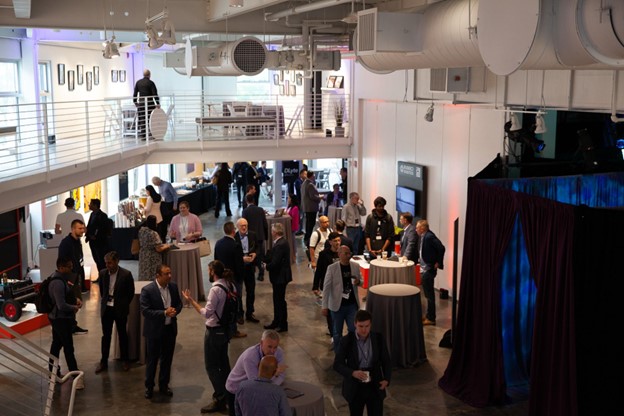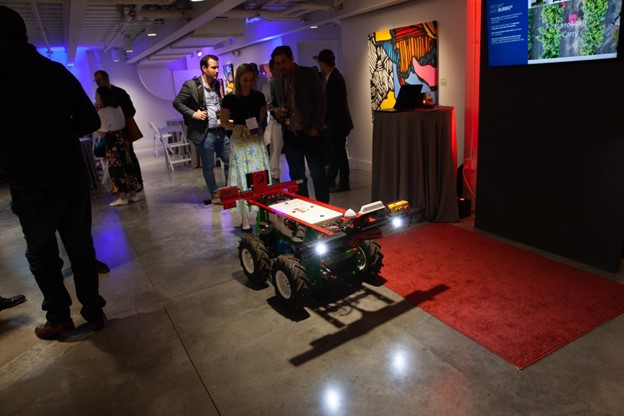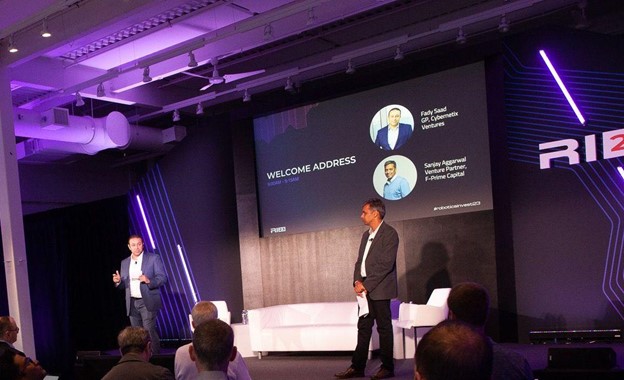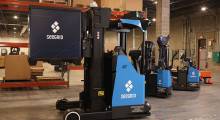More than 200 investors, tech innovators, and serial entrepreneurs gathered last week to discuss how to identify and support robotics as its own investment class that can enable multiple industries.
“We want to help create and scale the next generation of robotics unicorns,” said Fady Saad, general partner at Cybernetix Ventures, which co-organized the event at Artists for Humanity in Boston.
Despite current economic headwinds, more than $100 billion has been invested globally in robotics in the past five years, noted Sanjay Aggarwal, venture partner at F-Prime Capital. He cited verticals such as agriculture, construction, and logistics.
“Business models are still evolving, exit opportunities are still being proven, and more investors are needed,” he said. “Robotics Invest is an opportunity for us all to learn from leaders in the industry and jointly create the playbooks for success.”
Identify opportunities
As robots move out of factories and warehouses into new spaces, startups must stay focused on a narrow value proposition and listen to prospective customers, observed speakers on the panel “Building Product, Manufacturing, and Supply Chain Strategies for Scale.”
“We see real adoption happening in cleaning robots,” said Faizan Sheikh, CEO of Avidbots.
“Our goal has been to provide a unit of value at the lowest cost,” said Shivani Torres, a former investor at Lemnos and co-founder of tunneling robot startup Petra. “You need subject-matter people to determine the feasibility. Solve the problem once, then scale.”
“Ask customers, ‘If there’s only one thing you want …’ such as cost per linear foot,” she recommended. “Build relationships with the project managers making decisions. It’s not just the lowest cost.”
Timing is as much a factor as feasibility, added Helen Greiner, co-founder of iRobot and CEO of weeding robot maker Tertill, which just merged with Harvest Automation. She related the anecdote of a Pepsi commercial with a non-iRobot vacuum that acclimated consumers to the possibility of home cleaning robots.
“What can we do now with the technology?” she asked. “If you can’t get a product-market fit at a reasonable price, don’t bother.”
Companies should also have discipline, said Peter Ashe, vice president of operations at mobile robot provider Locus Robotics. He observed that the robotics-as-a-service (RaaS) model is not just for shifting capital expenditures to operational expenses, but it’s also helpful for maintaining customer engagement.
RaaS is good for getting recurring revenue, but the return on investment (ROI) still needs to be less than 12 months, said Torres.
The panelists also agreed that robotics startups should focus on their core competencies when determining what to outsource to contract manufacturers.

Once robotics startups have identified the problems they’re aiming to solve and obtained initial funding, how can they grow to meet demand? Another panel at Robotics Invest discussed how to build go-to-market strategies for scale.
RightHand Robotics used a data-driven approach and built a relationship with integrator Dematic over seven years, recalled Yaro Tenzer, co-founder and chairman of the robotic picking company. Success is not just about scale, he said. Tenzer pointed out that Mick Mountz had said in the opening session that Kiva Systems never got to mass adoption, even at $100 million.
“Most startups think the technology out, but not the market,” observed Shibu Sasidharan, senior vice president at Dematic. “It’s not what the tech is but what is the problem and solution. Hardware, software, and services are never isolated.”
“We look at where you are in commercial evolution, ways to plug into other systems, and the ability to work together in the long term,” he said. “The flywheel takes a while to get going. Think about deployments – operators need training. A failure may not be the technology but in how the customer uses it.”
Sasidharan added that startups should do the first customer deployments themselves and then work with integrators when they go from tens to hundreds of units.
In fact, companies should try to get out in to the market as early as possible, said Derrick Morse, CEO of Rugged Robotics, which provides construction automation.
“In pilots, you’re still educating customers, so you have to find the right customers,” he said. Morse asserted that it’s OK to make mistakes, as long as proper expectations are set and startups listen to customer feedback. Investors might want to see revenue right away, and differentiation and the right partners can help.
“Big companies came to us but they had no expertise in that space,” Morse said. “Focus on integrators, channel partners, and customer access. We have three competitors, and they’re taking three different ways of approaching the market.”
“Companies are looking at Industry 4.0 roadmaps,” said Kasey Phillips, partner at Boston Consulting Group (BCG). She noted that intellectual property and integrating IT/OT (information and operational technologies) are other considerations for going to market.
Raising money in the later stage
Established companies have their own set of challenges as they look to raise more capital. In the panel “Raising Money From Later Stage Investors,” panelists highlighted some of the considerations venture capitalists think about when giving money to more mature businesses.
Neel Mehta, an investor at G2 Venture Partners, said that successful later stage companies have already proven that they offer a product that has scaled and is “mission critical” to a group of customers.
“You're out of pilot purgatory, and your adding real value and your customer is highly dependent on you,” he said. “That is one definition of scale and something we look for in companies that need investments.”
Milo Werner, a general partner at The Engine, an investment company out of Cambridge, Mass., said her firm spends a lot of time examining how versatile a company's product is in terms of the market it serves and the applications it can be used for.
“We're looking for markets that are multi-billion-dollar markets,” she said. “It's hard when you look at a robot that is just active in one area. We really want to see that can branch out into many different industries.”

More investors meet
On the second day of the conference, more than 25 founders met with venture capital firms including Cybernetix, F-Prime, Playground Global, Seed2Growth, Prime Movers Lab, and AlleyCorp Robotics.
Robotics Invest 2023 was supported by underwriters from the worlds of finance, technology, and services, including J.P. Morgan, TD Cowen, Cascadia, Baker Tilly, Fidelity, GPAINNOVA, AlleyCorp, Daversa Partners, Wolf Greenfield, and Latham & Watkins.
Cybernetix Ventures said it is planning for Robotics Invest to become an annual event, said Saad.
Editor's note: Cesareo Contreras contributed to this article.
About the Author
Follow Robotics 24/7 on Linkedin
Article topics
Email Sign Up
















